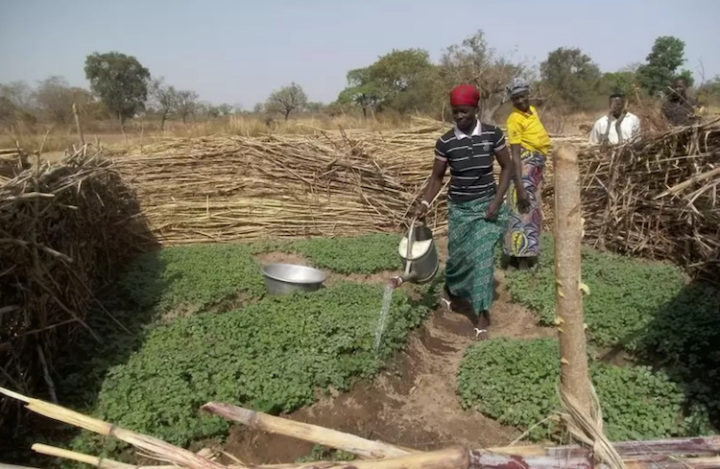Income Opportunities for Women
By Ramesh Jaura
Togo in West Africa is the venue of a milestone project between Soka Gakkai, a global community-based Buddhist organization and the International Tropical Timber Organization (ITTO). The two have signed a memorandum to launch a reforestation project offering income opportunities for women’s groups in two rural areas of Togo.
The memorandum involving a donation of 10 million yen (US$93,300) for the initial one-year phase of the project was signed on July 1 at the Soka Gakkai (SG) headquarters in Tokyo. The project will kick off on September 1.
It will address climate change, poverty and gender issues in Togo, where forests are being lost rapidly and poverty is increasing. The coronavirus pandemic has also constrained people to return to rural villages, increasing the strain on forest resources.
The Soka Gakkai promotes peace, culture and education centered on respect for the dignity of life, and Sustainable Development Goals (SDGs). The focus among others is on: protection of the natural environment through projects and institutions including the Soka Institute for Environmental Studies and Research of the Amazon, as well on raising awareness of the pressing need of achieving SDGs through media projects such as the one with the non-profit International Press Syndicate. The Soka Gakkai has 12 million members around the world, who contribute to society based on the humanistic philosophy of Nichiren Buddhism.
The ITTO is an intergovernmental organization promoting the sustainable management and conservation of tropical forests and the expansion and diversification of international trade in tropical timber from sustainably managed and legally harvested forests.
The Soka Gakkai-ITTO project is in line with Togo’s national climate adaptation plan (NAP) and the national determined contribution (NDC) under the UNFCCC Paris Agreement of 2015. It will contribute to SDGs 1 (No Poverty), 5 (Gender Equality), 13 (Climate Action), and 15 (Life on Land).
Forests are dwindling rapidly in Togo due to pressure from a growing population, the expansion of agriculture, overexploitation, extreme weather events, and a lack of local capacity to implement sustainable forest management, leading to negative impacts on food security, wood supply and livelihoods.
The Ministry for the Environment and Forest Resources (MERF) revealed in 2018 that the rate of degradation of Togolese forests is one of the highest in the world.
Women in rural communities are among the most affected due to gender inequalities. The project will help them increase their organizational, managerial and technical skills in nursery establishment and maintenance, enrichment planting for woodfuel, agroforestry, food cropping, and the production of wood and non-wood forest products for sale in local markets.
ITTO Executive President Dr Gerhard Dieterle said: “Often people talk about protecting the forest without concern for people’s lives. This project will protect women’s rights, boost the rural economy and food security and restore degraded forest.” This is exactly the kind of innovative, grassroots initiative that can make a huge difference to the lives of rural women as well as protect local forests, added Dr Dieterle.
Soka Gakkai President Minoru Harada said his organization was glad to support the project, which will bring real benefit to rural women and their families.
Tracing the origins of the joint project, a Soka Gakkai source explained that the organization is keen to support Sustainable Development Goals (SDGs) in Africa – in particular ending poverty, achieving gender equality and empowering women, encouraging urgent action to fight climate change and its impacts, as well as protecting, restoring and promote sustainable use of terrestrial ecosystems, sustainably managing forests, combating desertification, and halting and reversing land degradation and halting biodiversity loss.
With this in view, Soka Gakkai had over the years been discussing ways and means of realising the four objectives. Subsequently, the organization exchanged views with the ITTO which has its headquarters in Yokohama, the port city south of Tokyo. It developed interest in the organization’s activities aiming to promote women’s empowerment and poverty reduction through reforestation.
Soka Gakkai also learned about the African Women’s Network for Community Management of Forests (REFACOF), a non-governmental organization (NGO), a local partner of ITTO. The NGO has been successful in developing activities which Soka Gakkai found worth emulating in countries such as Côte d’Ivoire and Ghana.
Soka Gakkai learned that REFACOF was planning new similar undertakings and offered to support a joint project. According to the SG-ITTO memorandum, the REFACOF NGO will support women’s groups in two of Togo’s poorest prefectures; Blitta and Lacs.
In the Pagala-gare village of Blitta Prefecture, forest restoration and enrichment planting will take place, and in Lacs Prefecture, a community forest for fuelwood will be created on a plot made available by the chieftaincy of Agouegan village. In both villages, agroforestry trees will also be planted on family land. [IDN-InDepthNews – 05 July 2020]
Photo: Women tend a community nursery created as part of a completed ITTO project to assist forest landscape restoration in Togo. Credit: ODEF






